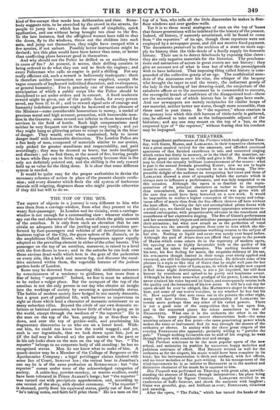THE TOP OF THE 'BUS.
THE aspect of objects in a journey is very different to him who sees them from a carriage-window, from what they present to the weary foot-passenger. In London and its vicinity, even a carriage- window is not enough for a commanding view : whoever wishes to spy out the real character of the land, must climb the giddy summit of the omnibus. It is only from such an elevation that he can obtain an adequate idea of the jostling and mazy evolutions per- formed by foot-passengers and vehicles of all descriptions in the business region of the City, the gayer sphere of Sr. James's, or in the amphibious Oxford Street, whose frequenters appear equally adapted to the prevailing element in either of the other haunts. The passenger on the top of an omnibus, moreover, is raised to a level with the first-floors in town ; and in the suburbs he can look over those envious dead-walls which hem in the gaze of the pedestrian on every side, like a brick and mortar fog, and discover the rural- ities enclosed within them, the vegetable harems of the jealous garden-lords of London.
Some may be deterred from mounting this ambitious eminence by consciousness of a tendency to giddiness, but more from a fear of being " ungenteel." Indeed, we fear it must be admitted to be rather a vulgar place. But the occupant of the top of the omnibus is not the only person in our day who obtains an insight into the workings of society by assuming a questionable status. The habits of modern society have hedged in not merely domestic, but a great part of political life, with barriers as impervious to sight as those which lend a character of monastic retirement to so many suburban villas. Beyond the circle of our own domestic re- lations or habitual associates, we know little of what is going on in the world, except through the medium of " the reporter." He is the man on the top of the 'bus, peeping in at first-floor win- dows, and over the top of garden-walls, and proclaiming his fragmentary discoveries to us who are on a lower level. With- out him, we could not know how the world wagged; and yet, such is our ingratitude, that we look down upon him, just as (if the bull may be allowed us) the petit maitre on the pave or in his cab looks down on the man on the top of the 'bus. " The reporter" belongs to no corporate body of old standing: he has no recognized status. Men do not know what to make of him. A quack-doctor may be a Member of the College of Surgeons or the Apothecaries Company ; a legal pettifogger claims kindred with some Inn of Court, however low ; the veriest bear in Jonathan's can say he is of the same profession as Itontscumn : but "the reporter" comes under none of the acknowledged categories of
society. A cabin-boy, powder-monkey, or marine scullion, could have been tolerated in Prince ALBERT'S barge ; but "the reporter" was turned out with precipitate apprehension, and, according to one version of the story, with slender ceremony. "The reporter" is shunned, partly from his equivocal status, partly out of fear, for "he's taking notes, and faith he'll print them." He is a man on the top of a 'bus, who tells all the little discoveries he snakes in first- floor windows and over garden-walls.
Yet it is to these moral analogous of men on the top of 'buses that future generations will be indebted for the history of the present. Indeed, all history, if narrowly scrutinized, will be found to come from " the reporters" of its age, though those reporters were not employed by a newspaper press, and did not receive fixed payment. The documents preserved in the archives of a state no more sup- ply its history than the title-deeds of a family supply its domestic history. Their use is to detect falsehoods by exposing false dates : they are only negative materials for the historian. The proclama- tions and narratives of actors in great events are not history : they give an account not of what is true but of what the promulgators wish to have believed. That imposing thing called history is com- pounded of the collective gossip of an age. The confidential anec- dote of the statesman over his wine, the whisper of the laequey who brought the taper to seal the treaty, the indiscreet gossip of the lady in the hearing of her dressing-maid, the conjecture of the subaltern officer as to the movement he is commanded to execute, the revengeful breach of confidence of the disappointed tool—these are the materials out of which history has in all ages been made. And our newspapers are merely receptacles for similar heaps of raw material, neither better nor worse, though more accessible, than those used in past times. So "the reporter," whose cranium is the granary into which this rich harvest of tittle-tattle is gathered, may, be allowed to take rank as the indispensable adjunct of the historian ; and any one may mount on the top of a 'bus, as the corporeal type of "the reporter," without fearing that his conduct may be impugned.


























 Previous page
Previous page